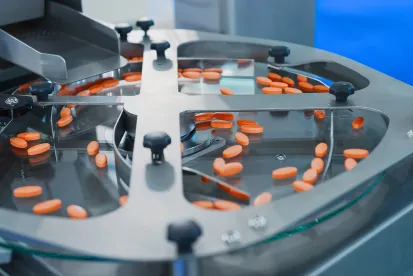On January 1, 2022, S.B. 763 took effect in Oregon, requiring pharmaceutical sales representatives (PSRs) to obtain a license prior to marketing or promoting pharmaceutical products to health care providers. Oregon is not the first jurisdiction to enact such a law, but it is one of few jurisdictions in the United States to require licensure or registration of PSRs. This post discusses S.B. 763 and similar laws, regulations, and ordinances that are in effect in Nevada, Illinois, and Washington, D.C. below.
Oregon
S.B. 763 covers PSRs that market or promote pharmaceutical products to health care providers. A “health care provider” is a person or entity licensed, certified, or otherwise authorized under Oregon law to prescribe, provide, or dispense pharmaceutical products. If a PSR visits health care providers in the state of Oregon for more than 15 days in a calendar year, the PSR is required to obtain a license from the Department of Consumer and Business Services (DCBS).
In order to obtain the license, an applicant must complete a professional education course that the Director of the DCBS specifies. The education course may include training in ethics, pharmacology, and pharmaceutical marketing laws and rules. Critically, DCBS specifies persons that are qualified to provide the professional education, and employers cannot provide the professional education. The applicant must also complete an application form, which includes their business and personal contact information, documentation demonstrating completion of professional education, and pay a licensing fee of $750.
Once a PSR is licensed, they must provide DCBS with certain information, which includes:
-
Documentation showing completion of professional education;
-
A list of healthcare providers within Oregon that the PSR has contacted since DCBS’s last request or within the calendar year;
-
The number of times that the PSR has contacted each health care provider;
-
The pharmaceutical products promoted;
-
Whether the PSR provided any product samples, materials or gifts and, if so, their monetary value; and
-
Whether the PSR compensated the health care provider for their time.
Once DCBS issues the license, it is valid through the calendar year issued and cannot be transferred. Additionally, if there are any changes to the information in the PSR’s application or any material changes to the licensed PSR’s business operations, the licensee must inform the DCBS in writing of such changes. DCBS may specify by rule what constitutes a “material change” to business operations.
Chicago, Illinois
Since July 1, 2017, Section 4-6-310 of the Municipal Code of Chicago requires PSRs who market or promote pharmaceuticals to health care professionals within Chicago for more than fifteen calendar days per year to obtain a license from the City of Chicago Business Affairs and Consumer Protection. A “health care professional” means any physician or health care practitioner that is licensed to provide health care services or prescribe pharmaceutical or biologic products. The definition excludes medical science liaisons, wholesale distributors, and pharmaceutical representative managers, or supervisors, who do not interact directly with health care professionals while in Chicago.
In order to obtain or renew a license, a pharmaceutical representative must complete professional education, which can include training on ethics, pharmacology, laws and regulations applicable to pharmaceutical marketing, and other areas that the Commissioner of Public Health (CPH) can designate. The CPH will designate and publish institutions that can provide courses that would satisfy the continuing education requirement. Similar to Oregon, a PSR’s employer cannot provide the professional education.
Pharmaceutical representatives must provide the following information to CPH:
-
A list of health care professionals within the City of Chicago contacted;
-
The number of times the health care professionals were contacted;
-
The location and duration of contact;
-
The pharmaceuticals promoted;
-
Whether product samples, materials, or gifts of any value were provided to the health care professional and the value of the products, materials, or gifts; and
-
Whether and how the health care professional was compensated for contact with the pharmaceutical representative.
Nevada
Since October 1, 2017, Section 439B.660 of the Nevada Revised Statutes requires prescription drug manufacturers to provide a list of their PSRs to the Nevada Department of Health and Human Services (NV HHS). If a PSR is included in a report made to the NV HHS, the PSR must submit an annual report to the NV HHS. If the PSR is not on the drug manufacturer’s list, the representative is not permitted to market the manufacturer’s drugs to any healthcare provider, pharmacy or its employees, or operators or employees of a medical facility. The PSR also cannot market the drugs for sale to any resident in Nevada.
The NV DHHS’ Drug Transparency Technical Guidelines (Guidelines) indicate that a PSR operates in Nevada if the PSR physically resides in or visits Nevada for five days or more to communicate with health care providers. A PSR cannot engage in the marketing of prescription drugs to doctors or other health care providers, pharmacists or pharmacy employees, and employees of medical facilities without being registered with the NV HHS. The Guidelines define “marketing” as “providing educational presentations and/or details to inform prescribers about their products as a way to influence them to purchase or prescribe them.” The Guidelines also state that a PSR must be registered if they meet with physicians or other healthcare providers to answer questions about the products, such as its use and benefits, or provide information and resources to key decision makers as a way to influence them to purchase or prescribe the product.
On or before March 1st of each year, any person that was included on a list submitted by a pharmaceutical drug manufacturer must submit to the NV HHS a report that includes:
-
The name and manufacturer of each prescription drug for which the representative provided a free sample to a provider of health care licensed, certified, or registered in Nevada, pharmacy or employee thereof, operator or employee of a medical facility or person licensed or certified in Nevada and the name of who the free sample was provided to; and
-
A list of health care providers, pharmacies and employees thereof, operators and employees of medical facilities that the pharmaceutical representative provided any type of compensation with a value exceeding $10 or total compensation with a value exceeding $100 in aggregate.
Washington, D.C.
Since October 1, 2008, Washington, D.C. has required "pharmaceutical detailers" (PDs) to obtain a license with the Board of Pharmacy (Board). The D.C. Code of Municipal Regulations 17-83 governs the licensure requirements An individual is deemed to be engaged in the “practice of pharmaceutical detailing” if they are a representative of a pharmaceutical manufacturer or labeler and they communicate in person with a licensed health professional a licensed health professional’s employees or representatives in Washington, D.C. The purpose of the communication must also be for selling, providing information about, or in any way promoting a pharmaceutical product.
An applicant must also furnish to the Board proof of graduation from a higher education institution, pay all required licensure fees, and provide a notarized statement to the Board that the applicant will abide by the requirements for the practice of pharmaceutical detailing, including the code of ethics. The Board will waive the educational requirement if the applicant submits a sworn statement attesting that they have been performing the functions of a pharmaceutical detailer for at least 32 hours per week for at least twelve months prior to March 26, 2008, and submit two letters from current or previous supervisors. Further, a PD seeking to renew their license must demonstrate completion of 15 hours of approved continuing education in the two years prior to their license’s expiration. These continuing education programs can be in medical and pharmaceutical terminology, FDA laws and regulations, pharmacology, professional ethics, and pharmacology, among other topics.
The license expires at midnight on the last day of February during even numbered years. The Board can request information from PDs related to their communications with licensed health professionals or their employees or representatives located in Washington D.C. Given this, a PD must retain documents and information related to his or her communications with these periods for a period of five years from the date of communication or contact. This documentation must include, but is not limited to:
-
The name, business address, and telephone number of the health care professional;
-
The date, time, and location of the visit;
-
The products discussed;
-
Whether samples were provided; and
-
The type of materials provided to the health care professional, if applicable.
The license remains in effect until the last day of February for even numbered years. If a PD leaves the employ of a pharmaceutical company, it must provide written notification the Board of Pharmacy within ten days. This notification must also include the contact information of someone at the PD’s former company from which the Board can obtain the above-discussed documentation.
Conclusion
It is critical for PSRs, PDs, and drug manufacturers in these jurisdictions to be cognizant of registration licensure or registration requirements. Working as a PSR or PD without the proper licensure or falling out of compliance with the above requirements can result in civil penalties, suspension, or even revocation of the license. Lawmakers and legislators must consider the future of each law given the increase in virtual marketing and promoting activities brought on by the COVID-19 pandemic. Each impose licensure requirements where the PSR or PD spends a certain amount of time in the state or where interactions with health care providers take place in person. Will a PSR or PD needs a license if they engage in marketing or promotion activities with providers in a state, but the PSR or PD is not themselves located in that state? What if both the provider and the PSR are in the same state, but their conversations do not take place in person? Legislators and regulators – whether in jurisdictions that have enacted such requirements or in states considering such requirements - must consider whether these requirements should also encompass virtual marketing and promotion interactions.




 />i
/>i
